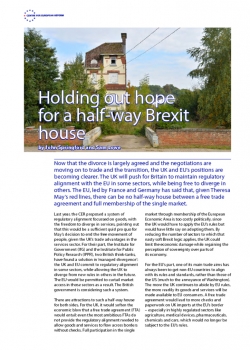
Holding out hope for a half-way Brexit house
The UK is considering 'managed divergence' from EU rules, which the 27 will reject. A better strategy would be to remain in the customs union and single market for goods.
Now that the divorce is largely agreed and the negotiations are moving on to trade and the transition, the UK and EU’s positions are becoming clearer. The UK will push for Britain to maintain regulatory alignment with the EU in some sectors, while being free to diverge in others. The EU, led by France and Germany has said that, given Theresa May’s red lines, there can be no half-way house between a free trade agreement and full membership of the single market.
Last year, the CER proposed a system of regulatory alignment focussed on goods, with the freedom to diverge in services, pointing out that this would be a sufficient quid pro quo for May’s decision to end the free movement of people, given the UK’s trade advantages in the services sector. For their part, the Institute for Government (IfG) and the Institute for Public Policy Research (IPPR), two British think-tanks, have explored the idea of ‘managed divergence’: the UK and EU commit to regulatory alignment in some sectors, while allowing the UK to diverge from new rules in others in the future. The EU would be permitted to curtail market access in those sectors as a result. The British government is considering such a system.
‘Managed divergence’ along the lines of the IfG and IPPR proposals is unlikely to gain traction among the 27.
There are attractions to such a half-way house for both sides. For the UK, it would soften the economic blow that a free trade agreement (FTA) would entail: even the most ambitious FTAs do not provide the regulatory alignment needed to allow goods and services to flow across borders without checks. Full participation in the single market through membership of the European Economic Area is too costly politically, since the UK would have to apply the EU’s rules but would have little say on adopting them. By reducing the number of sectors to which that nasty soft Brexit logic applies, the UK could limit the economic damage while regaining the perception of sovereignty over parts of its economy.
For the EU’s part, one of its main trade aims has always been to get non-EU countries to align with its rules and standards, rather than those of the US (much to the annoyance of Washington). The more the UK continues to abide by EU rules, the more readily its goods and services will be made available to EU consumers. A free trade agreement would lead to more checks and paperwork on UK imports at the EU’s border – especially in highly regulated sectors like agriculture, medical devices, pharmaceuticals, chemicals and cars, which would no longer be subject to the EU’s rules.
Yet, ‘managed divergence’ is unlikely to gain traction among the 27.
For one, it amounts to cherry-picking, which the EU has made a red line. The EU-27 would not agree to a system where the UK converges when deemed to be in its interest, but diverges in those sectors in which it could gain competitive advantage with the rest of the world. The point of the single market is that all its members sign up to all rules, which cover the entire economy; if the UK wins opt-outs, then other countries will seek them too.
Second, the process of managed divergence would prove difficult to manage. It would be a political feat for the EU and UK to agree which rules are crucial for maintaining a level playing field, and which matter less. Certain rules matter for the operation of several different markets (chemical regulations have an impact on other markets for products that use those chemicals, as well as on the environment), and some are highly specific to a particular market. The EU would say that all markets are interlinked, and the UK would say that opt-outs in specific sectors would not provide competitive advantages in others. And, since the economic impact of regulations is very hard to identify objectively, any disputes could prove impossible to manage. If the UK chose to diverge from one part of the EU’s insurance regime, should the EU have the right to curtail market access in the sector as a whole?
The EU is unlikely to countenance any model which undermines the single market’s political integrity. In that regard the 'managed divergence' proposal looks unlikely to stick. However, a model that may limit the damage and prove politically palatable to the EU-27 exists: the UK remains in a comprehensive customs union with the EU and the single market, but only for goods. Under such an agreement, there would be no process of managed divergence in different sectors over time.
The EU is unlikely to countenance any model which undermines the single market’s political integrity.
One could call this ‘the Jersey option’ (because the Crown Dependencies enjoy a similar relationship with the EU). The agreement would need to include the following features:
- Services access for UK firms would need to be roughly the same as that of any other third country. The UK, theoretically, could take to the world and try to sign services-only trade deals.
- The UK would need to agree to follow all of the rules of the customs union, single market rules for goods and the EU’s VAT regime. All industrial goods and agriculture would have to be covered. Anything less would create a situation where checks on origin and standards, among other things, would still be required at the border.
- The UK would have to agree to rules on state aid, industrial emissions and social and employment laws, to avoid the charge of environmental and social ‘dumping’.
- The agreement would need a surveillance mechanism, to check that the UK is complying with EU rules, and a court to settle disputes between the EU and the UK. Any new court would have to take account of the case law of the European Court of Justice.
- The EU would insist upon a financial contribution to the economic development of Central and Eastern Europe, among other things. The Swiss, for example, contribute around half the UK’s current payments per head. They have a similar level of access to the single market as the proposal outlined here.
- The biggest question is whether the EU would insist upon free movement of EU workers as it stands, or whether it might be possible for the UK to negotiate controls on free movement, in exchange for the obvious damage that this agreement would do to the City of London.
The Jersey option would also, unlike 'managed divergence', solve the Irish border issue.
The Jersey option would also, unlike 'managed divergence', solve the Irish border issue: there would be no need for border checks of any sort, since all goods shipped across it would be produced according to EU rules, and no tariffs would be payable. But it would require Theresa May to soften many of her red lines, and her party would be likely to defenestrate her if she did so. Perhaps a Labour government would be capable of delivering such a plan, but it would have to force an election – and win it – first.
John Springford is deputy director and Sam Lowe is a research fellow at the Centre for European Reform.

